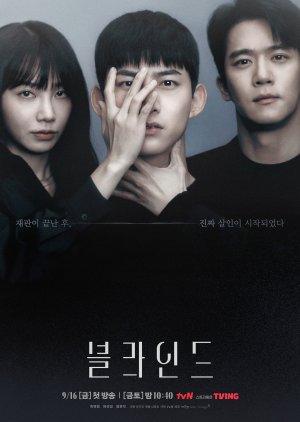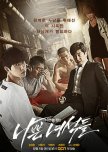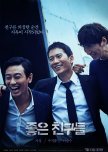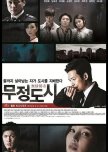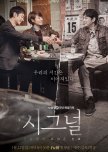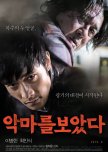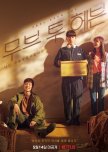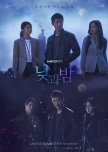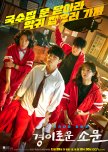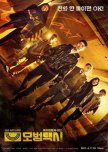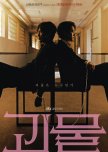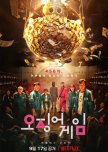
This review may contain spoilers
Exciting, yet gloomy thriller. The murder case being tried by a jury is just a kick off for more…
"Blind" is a fabulous, exciting, somewhat dark thriller."Blind" weaves its fictional story around 'survivors' of brutal child abuse and severely traumatizing exploitation as kids. These 'survivors' meet each other and their perpetrators 20 years later as adults. Each of those involved tried in his/her own way to come to terms with the past and lead a more or less normal life. Not only the abusive childhood, but also its psychological effects on their later life are a severe issue - and become a topic here. In addition, in this context complex interdependencies between the perpetrators of the time are dissolved and - against the background of a brutal variant of public vigilante justice - the original roles as perpetrators and victims are turned upside down.
"Blind" is haunting. The focus is on a murder case that is being tried by a jury. More murders follow. The dramaturgical setting is to some extent perhaps a bit reminiscent of an Agatha Christie novel - insofar as suddenly almost everyone in the case-related group of the selected jury could be the perpetrators... the distribution of roles between judges, investigators, victims and presumed suspects is also becoming increasingly opaque and fatefully intertwined. To pretend that one can turn a 'blind' eye to what used to be is no longer possible. Everyone must now look at the past and (even if it is perhaps a little late) bear the consequences. Magnificent.
----- SIDE NOTE: ---Child abuse - a sad and highly topical issue in South Korea ---
The thriller obviously saddles its story on the unspeakably sad topic of child abuse, which due to its unbroken topicality has increasingly made it into South Korea's series and film productions of recent years (among others "Children of Nobody" and "Mother" as drama or "Miss Baek" and "Bring me Home" as movie.) Many a well-established member of society prefer to look the other way when unbelievable deals are being made concerning minors, as long as they might even benefit themselves. And any 'survivors' can be glad if they manage to split off the traumatic experience to some extent - nevertheless most often PTS comes right along. Usually, those ´survivors´ until old age are psychologically still stuck in that desperate helplessness and inner agony of the past.
A South Korean government study from 2021 reveals, that abusive trafficking in minors has been rampant and even increasing in recent years. There is an acute need for action regarding more effective education in all public areas - from prevention to investigation and criminal prosecution up to employee training. A big problem with this: usually police officers or other officials are directly involved and work together with the traffickers, who specialize in the ruthless exploitation of minors. If the children and young people survive this, the psychological consequences of these deeply traumatizing experiences will be very hard - if at all - to be overcome. They are left helpless at the mercy of adults (who actually should take good care of them) and utterly hopeless in the face of a society that turns a blind eye to their torment. The only thing that is left: feeling betrayed and/or obviously of no worth whatsoever...
--------------------------
PS:
It may be that in reality a larger task force would have been set up to investigate the serial murders of the jury members. In my opinion, however, the KDrama didn't take anything away from keeping the circle compact in order to tell the story in its essential entanglements in a powerful way.
P.P.S.:
At last, I don't want to leave a pleasant detail (I think) unmentioned. We have seen it so often in KDramas: within the social ranking in South Korea, the older colleagues are obviously allowed to rebuke the younger ones with a shove, a kick or a snap on the forehead. (In view of my German socialization background, that is unheard of, but ...) In "Blind" one can now observe (among other things) that a transformation in this natural ranking behavior may be starting to happen within the younger generation: a colleague police officer in "Blind" actually gives back to his colleague and stands up for himself. So far, I have seen this rather rarely, if at all. Until now, as a rule in comparable situations, the fist usually remained in the pocket. In the mass consciousness, KDrama is relating to, starting 2022 such physical rebuke might obviously no longer be tolerated as a matter of course. Stand-up-for-your-rights seems to/wants to become possible - like a wind breeze of change coming up within a hierarchical tradition since centuries chiseled in stone...
Was this review helpful to you?
Great!
I have no complaints about this drama. I think it does lack music compared to most of the dramas I've seen but I understand why, I think a lot of music in scenes wouldn't suit this drama. I love the storyline, I feel like I have a reason to suspect almost everyone. The cast is also incredible! Any drama starring Ok Taecyeon is a masterpiece and he's one of my fave actors, he's so versatile and expressive. Ha Seokjin is new to me and he's very impressive, especially the way his acting flows naturally. EunJi is also new to me and she did really well and made her character feel very real. Overall, I love the vibe of the drama. I love how everytime a new episode comes out, I understand more of the story but at the same time I start suspecting more and more people. Definitely worth watching for me. the plot has a way of making every character suspicious but at the same time not suspicious. There's great details and the way the actors portrayed their roles just made it even better. 9/10 at least for me. I know many people dislike "loop holes" but personally I dont care about that stuff. the drama is thrilling so I love it. Personally I kind of hope Sungjun (male lead) has disassociative identity disorder or like a spilt personality because sometimes he seems very evil to me and sometimes he feels very sincere. I feel like he also doesnt remember much at some moments.I really like SungJun and SungHoon so far so I hope they expand on their relationship and I kind of want to see some wholesome moments between them. Anyway, I love how this show is going and I cant wait for next episode!
edit: after watching episode 4,5,6 I changed my mind. I dont like this show, I love it! I also love that Sung Jun always tries to joke around with his brother, I find that funny especially when his brother reacts awkwardly or seriously. I really like it, especially the scene when Sung Jun hugged his brother in episode 6 even though his brother didnt hug back. I hope to see more of their relationship and Im loving the story. Sung Jun is either the killer who had disassociative identity disorder and doesnt remember doing it OR he is just very unlucky and always just happens to be at the wrong place at the wrong time.
Edit: I finished this drama while it was airing but forgot to update my review. So my final thoughts are, I quite like teh ending. It did surprise me but I think it was fitting and I can easily conclude that blind is my favorite crime/mystery drama! Strongly reccomend. I know it has some plot holes, but it's a very fun and interesting watch for fans of murder mystery.
Was this review helpful to you?

This review may contain spoilers
Jibin (Yoonjae) and Seungyun (Charles) as personifications of true love
The heartbreaking psychological thriller "Blind" was a noteworthy example of implied romantic chemistry between two men, Jibin (Yoonjae) and Seungyun (Charles), whose feelings came to the surface through a precipitous movement towards tragedyEven more so than the lingering touches and eye contacts, the bitter ending was marked by a codification that signified the romance identity: https://ibb.co/68q0Qgk
*A pact suicide*
Orphaned and abused, Jibin (Yoonjae) carried the weight of his sister's sexual assault for two decades. He wanted, nay needed, the justice that the law couldn't guarantee and took matters into his own hands; doing unto his tormentors as they did unto him
*A family for a family*
Undertaking a mission for reprisal, Jibin (Yoonjae) found an ally in Seungyun (Charles). "You have me," Seungyun (Charles) told Jibin (Yoonjae), promising to never abandon him or let him "take the fall alone"
The story reached its denouement. Jibin (Yoonjae) made a final attempt to wound Moonkang before taking his leave from the world that showed him little kindness. Seungyun (Charles), devastated by the loss of his beloved, clutched a photograph of Jibin (Yoonjae) and departed from the world that lost its meaning. His suicide was driven by the passion of the exceptionally close and devoted pair of star-crossed lovers. His love for Jibin (Yoonjae) was tender; a love in its truest form
Conclusion: ship Jibin (Yoonjae) with Seungyun (Charles), Seokjin (Sunghoon) and Taecyeon (Sungjoon) for clear skin
Was this review helpful to you?

strong start, but disappointing end
This drama had such a good start! I was immediately hooked within the first few minutes. The intrigue of the what exactly was going on at the welfare center, who all the kids were, and what had happened to them had me thinking about this drama for days. I looked forward to the weekend so that I could watch the new episodes and then discuss possible killers with my sister. It was so much fun and I was excited to see how the story played out.However. About midway through the drama, when things started to be revealed, I started to get frustrated with the writing. What I mean is that the writers seemed to treat the audience like we're dumb and continuously tried to trick us. They would HEAVILY imply that certain characters were the killer and then in the next few episodes be like, just kidding! It's actually this other person (who would proceed to act incredibly suspicious). I can't stand when shows do that. It feels like lazy writing. Instead of doing proper foreshadowing they spend all their time writing twists into the plot just to confuse/trick the audience.
I really did like the first part of the drama and I enjoyed watching all the actors, but overall I was just disappointed by how the story played out.
Was this review helpful to you?

This review may contain spoilers
The best thing to do is to go into this drama blind
TL; DR: It's a drama that deals with a lot of difficult issues, particularly surrounding child abuse and adults' constant abuse of power, which ends in a lot of people (especially the victims) being let down. And for the most part, it is a revenge story with main characters who want the truth to be revealed. A really interesting and eye-opening watch. (I'm sorry this review is soo long)---
You know how you’ll accidently tangle your earphones and try to undo the knots, but every time, a new, much smaller knot appears? You can’t just simply unravel it, that’s now how it works. It takes precision and dedication. And that’s how I sum up this drama. And if that sounds interesting, give it go! 🙂 And the fact that the end has to mention that children and animals were kept safe during the shooting should indicate the type of drama that this is (i.e., it deals with heavy topics which I will include in a trigger warning at the end, so no one is accidently spoiled).
So, why is it called blind? Because in a world where children are most vulnerable, they are not being protected by adults. Instead, they are broken down by the adults around them. These adults are easily able to turn a blind eye to their own wrongdoings, both in the past and present. So much so, that when karma is coming back around, they still maintain a level of blindless where they refuse to accept responsibility or even acknowledge the fact that they are shitty human beings, like literal scum. The main characters, however, refuse to be blinded by this. They work to protect people who have been wronged and get them the support they deserve.
Now, on to the actual review…
---
Hm... I almost slightly regret starting this during the first week. It's a thriller. And it's confusing. Not because it's complicated, but more because you don't really know ANYTHING. But despite all that, it's very intriguing.
/PLOT/
I don't have much to say because it's a very mysterious plot. It's a drama that relies on flashbacks at the start of episodes that slowly reveal more and more like a jigsaw puzzle … that just never seems to end..? I'm eager to be able to understand everything that has happened between the flashbacks and present day, and finally connect all the puzzle pieces, yet nervous to know all the bad things that have happened.
The best one sentence synopsis I can give you is: A revenge story focusing on hurting the people around the targets/puppets, rather than the puppets themselves, with an unknown puppeteer controlling everything/everyone.
To add to that, I do think the pacing is okay. It's fast paced in the sense that it feels like the side characters are doing more of the work whilst main characters are in danger. Although this does change, it doesn't exactly feel like the plot is progressing, but I will expand upon that a bit in the next paragraph.
I did have a small gripe early on with how everything seemed so contrived. And I will say that I managed to figure out how it was possible toward the end, and it was then confirmed in the last few episodes, so I'm happy about that. They did manage to fit everything in nicely, in my opinion. Other than that, I also have to bring u the fact that SUNG JOON kept doing his police duties ALONE. He would randomly go meet up with a perpetrator in the middle of the night to arrest him by himself, despite spending the day with his team trying to find said person. Why does he not have a partner??
But since then, another annoyance came into existence (to do with choice the writers made). This will probably count as a spoiler so BEWARE and just skip this paragraph if you want to
⚠️ So, as I previously mentioned, rather than targeting the real baddies, they targeted their children. And in every single case, their children were daughters. And the kids all locked up in Hope Welfare Centre were boys. And I'm not sure why, it just feels icky, especially since nearly all of the baddies were men. So, in order for a character to exact their revenge, they targeted the children of the people they hated, without thinking about how it would affect the children of the buddies' children, for example. I can't quite explain why, but it rubs me the wrong way. Also, one girl who was killed had no connection to the Hope Welfare Centre other than knowing EUN KI. I also just don't understand why she had to be killed, or the events leading to her being in danger in the safest place for her. ⚠️
This begs the question then, when is revenge taken too far? At what point do these innocent victims exacting revenge on behalf of their childhood selves just become just as bad the perpetrators who caused them so much grief? Definitely a bit of a morality thing to consider. Also, the plot twists were good.
/CHARACTERS/
The main characters that we follow seem slightly unique compared to other thrillers. We know who the protagonists are, but as for the antagonists, they remain, to some extent, a mystery. There is also more than one antagonist. But we're not following the person exacting revenge, instead we're following three people who are also just trying to understand what is going on, just like the audience. In that sense, it's very refreshing, but it's easy to wish that they would hurry up and figure at least one thing out. I feel like the side characters know more than the actual main leads at times, which can be frustrating, especially since I'm waiting for the characters to be on the same page and understand they have a common goal.
the FL (EUN KI) is the rational mind, the third-party perspective that - for the most part - doesn’t necessarily have any personal ties to most of the characters. The two MLs on the other hand are a bit different. Whilst one is more rational (SUNG HOON) than the other, he’s still involved in a way that causes him to fight with the other ML, who happens to be his brother (SUNG JOON). Despite the annoyance some of the characters bring me, I still enjoyed watching them, and I did for the most part like them. SUNG JOON is definitely annoying towards the start because he just does not listen, but I do tend to root for him more and I like him. SUN HOON was definitely a bit boring. He did have some nice interactions with YU NA (a side character connected to EUN KI) which I appreciated for its wholesomeness. And EUN KI, EUN KI, EUN KI. My favourite character by far that pretty much just became a background character. Towards the end, she just started slowly disappearing and there were less and less scenes with her. And her contribution seemed to also dwindle and her role as a character, role in the story, and her role as a social workers became less significant. And I truly did miss seeing her by the end. I think that once more information was revealed, she writers of this drama kind of put her in her place and didn't really let her move.
/MUSIC/
In most thrillers, the music tends to be subtle, and this is no exception. It's not constantly there, but I like it when it is. If anything, this has more of a film score than anything. It's eerie and quiet and it works. For the actual OSTs that exist, I really like them. There is one song that kept being played in the final episode which I'm trying to find still.
/REWATCH/
Thrillers in general can be fun to rewatch because it's nice to be able to go back and pick up on small things and understand them better. And with a drama like BLIND, I can't wait to be able to binge watch this (probably years later) but be able to pay attention to detail a bit more, particularly the characters themselves.
/OVERALL/
I actually liked the ending, in terms of where the main characters ended up. But at the same time, I feel like justice wasn't fully served. Certain people were just slightly tossed to the side to make room/screentime for the main characters, and we didn't get to see them being fully punished because of it. And I kind of feel numb now. I'm sat her just wondering what to rate it and how I even feel about it. I am sad that it has come to an end. I had high hopes - 2022 has given us a lot of thriller kdramas, and I hope this can be added to my list of favourites with a satisfying ending! But still, I think I just want to forget about this drama for a few weeks, come back, and really deduct how I felt about this.
I also want to mention the importance of a character like EUN KI. As SUNG JOON mentions in the final few minutes, if those kids had someone like EUN KI to support them and guide them, a lot of things could have turned out differently. But of course, at the end of the day, the fault is on the people who ultimately abused their power by either abusing others, by turning their head the other way and ignoring those in pain. And I think that this drama raises those very important points.
---
[02/10/2022 update - some comments I have after watching eps 5 and 6 - no spoilers] I just didn't know how to fit it into the review...
I'm almost annoyed with how slow certain things are progressing.
Also, I have a few theories on who's who but because the side characters are hardly ever seen, it's easy for us to suspect them since we hardly know them.
And some of it seems SOOO contrived and obviously fictional. E.g., what are the chances that the victims and perpetrators of a case, along with the police and judges involved and the jurors are (nearly) all somehow connected through their past (which is extremely dark). I'm expecting some very good storytelling when it comes to the mastermind behind all this considering this person has managed to get them all in the same vicinity and is messing with all of them to this extent.
I will say that SUNG JOON is so freaking impulsive that it began to bother me. He's that one character in a horror film who goes through the door when we all know he'll be killed. Like, come on!! Your brother tells you to make sure you tell him before doing something, and you just decide not to? He's constantly putting himself into situations where he could be seen as suspicious, and he doesn't seem to care...? Or realise why it's such a bad decision.
---
tw // child abuse, murder, kidnapping, torturing, mentions of sexual assault
Was this review helpful to you?
Waste of a Good Premise
Sigh. What a colossal waste of so much potential. Blind wasn’t bad to the point of unwatchable but it was a waste of a good premise. Wasted, dare I say, on gimmickry (a de facto mystery box) so that in the end the narrative focus shifted from where it should have been — on the survivors of human rights abuses to the present-day murders and original villains from the Hope Welfare Centre running interference. The last half hour or so of the series was a decent wrap but not enough to save the rest of the package for me at least. It’s a shame really because the show had the opportunity to do something of substance with regards to exploring the egregious of human rights violations at the centre of the narrative but instead pandered to all the worst excesses of a K drama crime show. Corrupt cops going from bad to worse to cover their rear ends. Corrupt bureaucrats who don't see the error of their ways. Tight-lipped witnesses who have some "compelling reason" to stay mum. Over eager cops rushing headlong into situations for which they are unprepared. Incompetent cops floundering around causing problems or being designated comic relief. And frankly, not every K drama has to have an serial killing angle to it. It doesn’t always enhance a show. In this case it does almost nothing except create moral confusion about which characters to root for. The fixation to turn this into a jigsaw puzzle about who the mastermind behind the present day murders made it hard to connect with any of the characters.The actors should get their due for powering through this and throwing themselves into this over convoluted script. This has got to be one of the worst revenge plots I’ve ever seen especially considering the competing goals of the conspirators. The so-called “mastermind” lost control of the scheme very early on which led to more of a blood bath than was intended. Count of Monte Cristo this certainly is not. It’s not even on par with the far more straightforward Taxi Driver. All throughout the script gave a very superficial impression that this was a much more complex story than it really was. In reality, putting aside all the unwanted (and clumsy) interventions, the list of suspects was always fairly short. Only a handful of individuals could be party to the conspiracy to avenge. Moreover, the jury tampering for the first trial so that everyone’s in the same place on hindsight seem completely unnecessary. Plus I’m none the wiser as to how that was so easily achieved.
On some level I don’t think it’s a problem to be over using red herrings per se if the red herrings have another purpose apart from putting the breaks on plot progression. I’m not a fan of suspense for suspense sake especially when it’s rather obvious even before the final act who the perpetrators are.
16 episodes is too long for a familiar plot like this. (Especially when it aired around the same time as May It Please the Court) The pacing is a problem. There’s a great deal of intensity in the early episodes and then it falters, picks up a little and then slows down before the big reveals in the finale. Episode 13 saw me hitting the roof especially the latter part because it demonstrated how the conspirators could have achieved their revenge in a far more efficient fashion while revealing to the world what was done to the children in the welfare centre. All of that without tainting their cause and undermining whatever moral credibility that they had as victims of an unjust system. This show could have easily been achieved in under 10 episodes easily. And the messaging would not be as compromised as it ended up being.
Was this review helpful to you?

BLIND: ONLY WHEN YOU TURN A "BLIND" EYE TO THE ABSOLUTELY OBVIOUS
"blind: when the young have to teach the adults what's wrong and what's right"*PERSONAL OPINION*
Ryu Sung Joon said, "if the children of the Hope Welfare Centre had an adult like Eun Ki would they have ended up like they had?"
this got me thinking, how true this was, how children are easily affected because of their surroundings and what kind of adults they ultimately become. the drama deals with some the very common but vital issues of all times-child abuse in particular, and abuse of authority, rape and providing sexual favors in general. it highlights what it takes to become a true adult and how many fail to become one, in face of power, money, pleasure, protection and lies among many.
*PLOT & CHARACTERS*
with its many twists and turns and snaps and sides, it was a roller coaster ride. i was so sure that Ryu Sung Hoon wasn't involved at all, but boom the next thing you know he's the brain. Eun Ki was the best and all that anyone would expect a "decent" and good human would be. Sung Joon was the emotional container of the show. he was brilliant when it came to his duties and responsibilities but he as much a soft baby. i felt him whenever he realized he was being betrayed by the person he trusted the most. there weren't much plotholes to be honest, except the fact that the serial murders were taken so lightly by the authorities and everyone else. it felt like it was Sung Joon sole responsibility to solve the mystery and punish himself for nothing.
getting back at Sung Hoon, he was just a poor person: he lost his family not once but twice to the "adults", to his plan, and to the society; he lost his childhood to absue and the never ending saga to save himself and his friends; he lost his youth to planning the revenge; and he lost everything else to the outcomes of his actions. Sung Joon was right when he said that Sung Hoon was "cowardly and evil". He was evil because he knew what he did was wrong yet he wanted to leave out on his share of pain that he had yet to endure and yeild.
Eun Ki was the angel. And she is what i wish to become, " a decent adult" as Yu Na says. I wonder how someone would take the fact that they were born out of rape; but she took it very fair enough as the strong woman she is.
PS. I wish those who were responsible for the incident at the Hope Welfare Centre, rot in hell. Amen.
*THE ACTORS*
All of them were chef's kiss, starting from Tace Yeon, Eun Ji, Seok Jin to the always-frowning-with slit-eyes police officer. I watched this drama, of course because of the genres, but also because this has my all time favorites as the leads. Bless my heart, when i was hoping for a romance angle of Eun Ji with both Seok Jin and Tace Yeon (TT), all the chemistry, physics, biology, mathematics and the tension they had was so on point.
Blind is a fantabulous must watch, be it be confusing, haunting, thriller or anything else (afterall it's meant to be). The music was so good that i kept on rewinding and replaying just to listen to the bgm.
PS. This is my first review, so i dont know it well it goes. Thank you.
Was this review helpful to you?

This review may contain spoilers
Man alive, what an absolute train wreck of wasted potential.
I'll start without spoilers and provide a warning when the spoilers start.This drama could have been a very successful average thriller or it could have been an extraordinary revenge story. But instead horrible writing, outrageous plotting and some, frankly, troubling moral backlighting led to the only drama I've ever watched in my life that actually kept me awake because of how angry I was.
And it is hard not to focus on the troubling moral themes when I think about this drama. However the reality is that these troubling moral themes are directly responsible for the otherwise inexplicably bad storytelling decisions. I can't read the writer's mind, but choices were made that were supported by blatant moralizing to the point that one assumes the writer had an Opinion.
When Blind began you already knew that one of those battered boys from the hellish orphanage was involved somehow in what was going on. In the first episode we're introduced to very heavy material and a seemingly delicate approach to its attendant issues.
However, as the story progressed I came to realize that the writer didn't seem to view the adult survivors who endured that hell as actual people. Not in the sense that the other characters were. This is never stated explicitly. But more often than not these adult survivors were half-wrought caricature villains or, rarely, caricature victims who had lost most personhood in their embodiment of their trauma. And even when they were portrayed as human, time and again I felt a divide between them and the characters who were "normal." Like a black uncrossable chasm of wrongness would forever separate normal society from the survivors of unspeakable abuse so much so that those survivors simply couldn't be part of society. Not that they shouldn't, or ought to barred from it, but that they were so broken that they were incapable and it was frankly burdensome to society for them to try. This wasn't some megaphone message or anything, but the omnipresence of this mentality shone through the writing like a sizzling neon sign on a foggy hillside.
An argument could be made that these adult survivors were all depicted as irreparably damaged by their time at the orphanage to really convey how brutal the abuse was, or abuse in general. And I might even agree with that if it weren't for all the other things I had begun to notice. Too, I might not even have cared had the writer not deleted the final episode in place of a flaccid PSA about how murder is bad.
Here begin spoilers:
There were times when this was almost really good. The backstory of the abusive orphanage and the way every single juror was connected was very cool. The tiny pieces of information we received made us desperate for more, the relentlessly gloomy atmosphere just built and built...
The boys in the orphanage were organized by number. In the flashbacks we can identify them by the numbers on their shirts. Boy Number 11 is calm, paternal, self-sacrificing and noble. Boy Number 13 is characterized early on as somewhat off, perhaps a bit sociopathic, perhaps just angry and broken. Regardless, he's definitely unhinged and worrisome. When we originally suspected that Taec Yeon's character Song Joon was Boy Number 13 and thus possibly the serial killer, his brother and many others all suspected him as well. Though not for that reason, as no one else knew that he was possibly number 13. They suspected him because he already had a history of being generally violent and unhinged.
I feel like I should add a sidebar here that none of the characters, from about the last quarter of the drama onward, behaved with even a modicum of logical consistency. But I'll get to that in detail later.
When we first got the twist that Song Joon's adoptive brother Song Hoon was actually one of the survivors of that hellish orphanage, the kind and warm Boy Number 11, and not Song Joon, (who was just the biological son of terrible parents) it was a great twist. At that time I figured the plot was going to progress as follows (please indulge my creative liberties for a moment): Song Hoon, aka Boy Number 11, knows that his orphanage brother, the worrisome Boy Number 13, is the real serial killer out there wreaking havoc and getting his pound of flesh in murderous, gleeful bulk. However Boy 13's chaotic rampage is ruining Sung Hoon's (Boy 11) carefully planned scheme to expose the orphanage and get justice, given that he was a judge and, for about eighty percent of the drama, portrayed as an unwavering crusader for justice. However he had vowed to protect Number 13 when they were children so now he finds himself in this troubling situation where he feels obliged to continue doing so. And also is sort of forced to "use" Number 13's wonton murders in his plan. A thing that seemed to be torturing him. This made logical sense. It fit the events, it fit his character, it fit what hints we were seeing on the screen, I felt it had even been foreshadowed a bit. And in the end, I thought, the big issue for him was going to be which brother he would choose to protect, the murderous and unhinged Number 13 whom he had vowed to protect when they were children, or his adoptive brother Song Joon who worshipped and admired him. Which would he choose? Could he choose? That's where I thought we were going. But no. This is very much not what happens.
For one thing, every plot twist except the revelation about Sung Hoon was not a plot twist. It was the writer changing his mind mid way and then failing to rewrite previous episodes before they were filmed. So the twists contradict previous narrative and then clumsily try to make up for it. The absurd planted memories thing is the best example. We were given Sung Joon struggling with vivid memories of his time in that orphanage and then later the writing tried to convince us that not only had these been planted memories (???) but that this somehow served Sung Hoon's plan. (It didn't, trust me. According to this writer Sung Hoon only did that to mess with Sung Joon because of who his parents were.) That confused me. How could a person who treated other children with uncompromising compassion choose to treat another child with cruelty? To punish that child's parents? Perhaps I could believe that. But how could the same boy who protected other vulnerable children in the same breath mistreat a vulnerable child? It would have made more sense according to his character up to that point for him to view little tiny Sung Joon as another vulnerable victim. After all, the monsters who had been abusing the orphans were Sung Joon's biological parents. And they hadn't exactly been treating Sung Joon well.
What's more interesting is that prior to the revelation that he was not Number 13, the idea presented was that Sung Joon was violent and unhinged BECAUSE he was Number 13 and all those bad things had happened to him. When they revealed that all those memories had been planted it became this bizarre thing where, at first, it attempted to the prove the fallacy by saying, look: even when the memories are false it still makes a person unfit for society and inherently dangerous. But then later they just forgot about it entirely. Like the fact that he found out that the memories were false just deleted his violent tendencies.
Let's talk about Sung Hoon for a moment. This was one of the clumsiest and most absurd attempts I have ever seen at a complex and nuanced character. And the actor cannot be blamed. He did a remarkable job despite the horrific writing. This whole thing was honestly a criminal waste of a very talented actor's time and energy. This wasn't complexity. It was a writer who couldn't figure out who this character was from one episode to the next. A writer who couldn't comprehend the psychological damage and emotional trauma of profound abuse beyond "abused = broken and deranged, right?" Is he a staunch and unyielding defender of justice? Does he want to stop Number 13 from hurting people because hurting people is bad? Or does he agree that those people needed to be hurt? Is he conflicted about how much he loves his brother Sung Joon because it makes Number 13 feel abandoned? Or does he revel in the pain he causes the innocent relatives of his abusers? Is he trying to help people, like the troubled girl he seemed interested in sponsoring, or does he have a psychopathic lack of feeling for all life as we were meant to believe when he signed off on the cold-blooded murder of those two women? Was all of this a game to him, or was it justice for which he would gladly bleed or give his life? These weren't questions that were meant to be ambiguous. The writer emphatically stated that each of the above was the one single truth at various phases of the final act. This could have been layered and possibly, possibly interesting and even believable but instead it was so contradictory that it seriously destroyed my suspension of disbelief more than once. And Sung Hoon was the ONE character they had to get absolutely right. But they bungled so much that it was, frankly, embarrassing to watch.
Morally speaking, Sung Hoon represents a significant part of my biggest issue with this drama. Aside from the writer's inability to manage the writing of a killer's motives, it also seemed that they were relying on the viewer's understanding that he was too ruined to be good. The fact that they ineptly tried to make him conflicted while also embodying this idea made him an incomprehensible knot of confused contradictions. The writer wanted him to be sympathetic, but, you see, murder is bad and so he also had to be the epitome of evil. The nuance attempted in the writing of Sung Hoon had the delicacy of a sledge hammer. One gets the impression that the writer couldn't understand why someone would want to murder. Anyone who wants to murder is pure pitch black evil, plain and simple. Which idea was beaten into the narrative like an evangelical preacher pounding on his pulpit.
The writer bent the narrative into outrageous contortionist positions to really drive home the idea that Sung Hoon was a sadistic, inhuman monster. But after his arrest there was very, very little time spent getting into the crimes of those who looked the other way when things were happening at that orphanage. Almost no time was spent examining (or condemning) the deep, insidious and pervasive evil of that level of indifference. And the reality that every female orphan was sent to the "vacation home" never to be seen or heard from again was just not really a huge issue to the characters or writer. Sure, there was a montage where lots of people connected with the orphanage were rounded up by the police, but this felt like an afterthought. Their crimes certainly didn't seem like much of anything compared to an adult survivor committing murder. These were all just a bunch of average lowlifes. Sung Hoon was, apparently, Satan incarnate. Best exemplified in the social worker's bizarre moral contradictions by which she, without hesitation, completely washed her hands of Sung Hoon, dropping him like he was on fire, but could still socialize comfortably with a person who had done nothing all those years ago while watching young boys scream for help as they were being dragged through the forest by grown men. What's more, this person had "foreseen" that those boys would become murderers and had advised the evil guards to kill them there and then. And the social worker knew this.... It's hard to decide if her character is morally bankrupt or the writer.
Towards the end, the writer began the Campaign Against Murder™, and thus we were served the inane, scoldy moral superiority of the social worker (a likable character prior to this) who took it upon herself to carry out some of the most empty and imperious exhibitions of moralistic canting that the writer could think of. So egregiously meaningless and self-congratulatory as to feel like they meant for her to look absurd. I kept waiting for someone to tap her on the shoulder and say "hey, you're being both naïve and arrogant." Given my heightened level of annoyance at this point, it had begun to feel like the mere fact that she hadn't been one of the abused orphans was enough to gold plate any effort she made.
According to the moral landscape of this drama, the absurd measures she took to "help the victims" were going to be more effective in raising awareness than Sung Hoon's revenge plan. By the way, placing those two things on the table as the only two possible solutions for a problem that ugly and complex made me want to dropkick my computer into high earth orbit. For one thing, half-wrought moralizing has no place in a bleak revenge drama. You can't hold up a violently abused child and a horrendous murder and pronounce "one does not justify the other and that is the end of this conversation you can all go home I've fixed society." Unless a writer has the chops to extract the really uncomfortable layers of moral, ethical and social nuance in a story like that, they have no business touching it with a ten-foot pole.
Too, the core premise of the title, that evil can survive when people simply turn a blind eye to bad things, was never properly explored. The people who did that, who looked away or who got scared or who were paid to keep silent were ultimately treated by the narrative as victims themselves, with perhaps a little shame on their heads but nothing, nothing compared to Boy Number 11, obviously. Those other people didn't do anything bad, they just watched as little children were chained up in their underwear, beaten half to death, sexually abused, starved, passed around like candy and sometimes deliberately murdered and all they did was, you know, nothing. I mean, that's completely understandable, right? Lots of regular people would probably do nothing, right? Right? It's unnatural and unreasonable to be so angry about that you want to murder. Right?
On top of that, when Sung Hoon was revealed to have endured a long history of self harm, his brother, the "hero" of the story called him an evil coward. And said that not even this (or a suicide attempt) was enough to make up for what he had done. Which heavily suggested that people who self harm are not suffering from crippling emotional pain but are actually overwhelmed by guilt for real crimes. And thus self harm, too, can be seen as another indicator that the person is unfit for society.
The writer did convey that the monsters who ran the orphanage treated their own children like angels but the orphans like dogs because to them orphans were dogs. Which is, incidentally, another facet of the same problem that created such a clunky plot as this. This idea that those orphans were so removed from society that "good" people could treat them in ways too unspeakable to recount without, somehow, it having any effect on their humanity, again, strains credulity. But there's something ugly there that I can't be bothered to explore. Something about when the orphan survivors misbehaved innocent lives were lost, but when the regular people misbehaved they only actually caused harm to the lives of the nameless orphans...
There was something in there about the cycle of violence, but the credibility of such a message was lost in the noise of garbage.
I liked all three characters for most of the drama. But when Sung Hoon was revealed to be the killer, the way the other two treated him and the mentality behind that treatment was so inhumane and contradictory to their previous selves that not only could I not take it seriously from a storytelling standpoint but I no longer respected them as human beings. As far as I was concerned they could both go walk off a cliff and I wouldn't care.
Maybe now that I've got all that out of my system I can actually move on with my life.
Was this review helpful to you?

A Must-Watch for Thriller Lovers
I have to leave a review for this series because it's one of the few thrillers I've seen that actually made sense beginning to end. There are twists and turns throughout and the plot is perfectly paced with just enough story for 16 episodes. And there are no derailments into sci-fi nonsense (like a mid-series brain transplant for example...).The writers of this show had firm command over what to reveal when - playing with the audience just enough to keep the guessing game of who from the past is who in present day fun. I also loved the way this series explored brotherhood and what it means to be loyal.
I'm exceptionally picky with thrillers and this one delivered in a big way. If you like thrillers this is a must watch.
Was this review helpful to you?

This review may contain spoilers
The ending, I feel that something is absent.
Drama with so many plot holes and the sloppy police investigation.In my opinion, the drama ends without drawing special attention to the abused orphans or (lack of empathy) on the unfair deaths of the orphans. The crazy dog Baek Moon Kang killed at least 20 orphans (sent to university as cadavers donation). There are also crime of sexual favour and the sexual exploitation of the female orphans. Lack of justice. The judicial system is supposed to be totally fair.
~ From the beginning, I dislike the character of the detective Ryu Sung Joon. Too often, he use unnecessarily violent. He becomes extremely and uncontrollably angry, often to the point of violence when capturing suspects.
The ending of the drama makes me pity Sung Hoon. I feel sympathetic sorrow for Sung Hoon's substantial misfortune. Sung Hoon said that he wants revenge, not murder but Jung Yoon Jae enjoyed the killings.
Their revenge plan starts after Jung Yoon Jung died. The real killer is Jung Yoon Jae (juror Jung In Seong), he is such a psycho killer. Jung Yoon Jae displays psychopathic behavior since childhood. His serial killer behavior as an adult is based on choice, despite childhood experience.
Question :
Do the abused, traumatised orphans need to become 'monsters' in order to uncover the truth?
What with the sloppy police work, rush to judgment and failure to investigate?
Was this review helpful to you?
Acting and casts are both super powerful and really support the whole story, though at first you might be confused on who is who and the relationship of them. Shout out to Taecyeon, Ha SeokJin and Eunji in playing and becoming one with the character really well, and to Park JiBin as well, you acting is definitely outstanding.
The music really support the suspense and thrilling moment of the drama, especially the opening and ending OST, you will realize since the opening OST that this drama will be one of a heavy drama to watch.
Was this review helpful to you?

One of the best!
It's about humanity, family, thriller, suspense, ignorance, psychotic, trust.. all in one drama.This drama will touch your heart,
You'll be sad, angry, and think that everyone got what they deserved.
Ryu Sung Joon, a dedicated detective, longing for his family attention and love, especially from his brother Ryu Song Hoon, which he adores so much.
Ryu Sung Hoon, a dedicated judge, has lots of pain in his heart, always keep distance from everyone, and keep everything inside. Later on found that he's a survivor from Hope Children Center.
A case of murder made the brothers work together coz Jung Soon became a suspect.
However, along the way, lots of secrets revealed, more people being killed, and it is somehow related to their past.
With the help of Eun Ki, a female social worker, they investigate and try to clear Jung Soon's name.
Every episode starts with flashback of the children's camp, which always make me brokenhearted, sad, angry and hurt.
How cruel and sadistic the camp was, and how no one cares.
Finally the camp was shutdown on 2002, and the revenge starts 20 years later.
I won't say much into details, but i'd say : I LOVE IT! A must-watch drama.
PS :
there are actually children/teenage camps which torture the kids, even now.
I remember Paris Hilton shared her story when her parents sent her to a 'disciplinary' camp, where she'd actually been mentally and physically abused. No one even know how bad it was, not even the parents. We should be aware of places like that in real life.
Was this review helpful to you?

 1
1